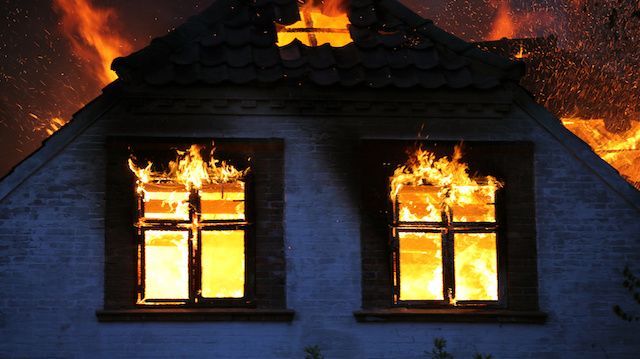
The fear of fire is one of the most common fears in the world — and for good reason. An uncontrolled fire can lead to loss of property, injury or even death. No one wants to go through the horrific experience of a house fire.
Having functional smoke detectors around your home and fire extinguishers within reach are crucial first steps. However, to prevent fires from starting in the first place, we need to examine where they most often start and how to minimize risk.
According to the National Fire Protection Association (NFPA): “Cooking fires are the number one cause of home fires and home injuries. The leading cause of fires in the kitchen is unattended cooking.”
This makes sense: The kitchen is the room in our home where we use high temperatures, or even open flame, to boil, saute, roast and grill on a daily basis. While I’m not saying that we should stop cooking, we do all need to be vigilant in taking safety precautions in the kitchen.
The first and most crucial measure, as the NFPA points out, is to never lose track of our food. The NFPA recommends staying in the kitchen at all times while frying, boiling, broiling or grilling food, and to check on food regularly if it’s roasting or simmering. Regularly peek into the oven or stock pot every 10 minutes or so, and don’t go far from the kitchen for the duration of cooking time.
If you’re in the next room and you’ve got something simmering on low heat on the stovetop — or a dish roasting in the oven — you should be fine as long as you’re checking on your food often. Don’t go outside or to another level of the house. The NFPA also recommends setting a timer so that you don’t forget about your food.
More safety tips from the NFPA:
- Don’t cook if you are exceptionally tired or under the influence of alcohol.
- Keep anything flammable (such as dish towels and oven mitts) a safe distance from cooking surfaces.
- Turn the burner off immediately if you see wisps of smoke, or notice your oil smelling charred.
- Put a lid immediately on small grease fires that may start in pots and pans, and immediately turn off the stove. Cook with a lid nearby so that you can act quickly. And never use water on a grease fire.
- In the case of small oven fires, turn off the oven and keep the oven door shut.
- If a fire is any larger than a tiny grease fire, get yourself and your family out of the house immediately, and call 911 from outside.
Heloise, a contributing editor to the popular magazine Good Housekeeping, also gave the following fire safety tips on Talco TV:
- Make sure that the fire extinguisher in your kitchen is Type K, which is suitable for grease fires.
- If you have a small grease fire and do not have a lid for the pan, pour baking soda over the base of the fire (do not try this with large fires, just get out). And remember, never use water to put out a grease fire.
- Be wary of using disposable bakeware for baking heavy foods (such as holiday turkeys). These may bend and cause grease spills.
- Always buy new, quality glassware to ensure it has not been scrubbed with metal. If it has, it may shatter.
- Always use the correct light bulb wattage.
- Never leave lit candles unattended.
- Don’t overload power strips.
- Never cover extension cords (if you do, you may not notice if they have worn down).
The key to preventing house fires is to stay aware and have a plan. Make sure everyone in your family knows the quickest escape route out of your home from all rooms — this is something you can all practice together. Test fire alarms regularly, and always unplug small appliances when they are not in use.
For details on many types of potential fire hazards, and how to stay safe, the NFPA has a compilation of safety tip sheets to help.
Remember, cook carefully!
—Tanya Rakhmilevich
Tanya is a writer at The Alternative Daily with a passion for meditation, music, poetry, and overall creative and active living. She has a special interest in exploring traditional Eastern remedies and superfoods from around the globe, and enjoys spending time immersed in nature.
Sources:
http://www.nfpa.org/safety-information/for-consumers/causes/cooking/safety-messages-about-cooking
http://www.nfpa.org/safety-information/safety-tip-sheets
http://www.heloise.com/watch_heloise.html

